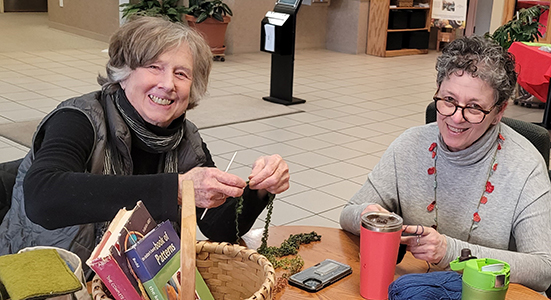||| BY STEVE BERNHEIM, theORCASONIAN REPORTER |||
The Planning Commission met May 6 to review the long overdue Transportation Element of the County’s draft comprehensive plan for the planning period from 2016-2036 and agreed to help promote cycling and retreat from shoreline roadways threatened by maintenance burdens from global warming.
On the subject of cycling, Commissioner Rick Hoffman (Lopez) called e-bikes “the wave of the future” and Commissioner Steve Rubey (Lopez) called for the San Juan Islands to become “the electric bike county of the country.” As a result, the Commission added goals and policies to:
- Prioritize development of bike lanes from the ferry terminals to the major points of interest on each island
- Encourage bike-safe roadway and trail designs, and
- Recommend using rights of way and private easements to provide for bike connectivity.
As for the County roads threatened by the warming planet, Commissioner Sheila Gaquin (Orcas) came with a prepared proposal to close shoreline roadways that are becoming too expensive to maintain. “We have so many streets in the county, roads that run along headlands and shoreline that are costing the county a fortune to keep maintained during floods, storms, general ongoing erosion,” she argued, and proposed the following addition to the draft comprehensive plan, which was agreed to by the others:
- Where adequate alternatives exist, decommission roads along sensitive shorelines and beaches in order to restore the environmental health of the shoreline and reduce excessive costs for repairing and maintaining these roads.
In connection with their review of long-term goals for water resources, Commissioners maintained their stance against any efforts between now and 2036 to manage water resources by monitoring and measuring water use. Instead, Commissioners agreed the County should use the next 14 years’ time to “explore methods” of water measurement. The Commission also stood by its prior decision to take out a goal ensuring that development through 2036 does not impact water available for Agricultural Resource Lands. And even though rain catchment is already an approvable source for drinking water in the County, the Commission reaffirmed adding a new goal to the draft comprehensive plan that would “Establish policies regarding rain catchment systems.”
Technically speaking, the meeting did not begin as scheduled due, in part, to announcement of the wrong hyperlink connections to the meeting. About thirty audience and participants attempting to join the meeting spent a half hour exchanging informal remarks until a minimum level of public meeting compliance was established according to an offline call with the County Prosecutor. Some of the public comment requested and received before the advertised deadline was not distributed to Commissioners or the public record before the meeting; some Commissioners have wanted to delay decisions in order to hear more opinions from special groups or persons: Commissioner Knoellinger (Orcas) asked for more comments from the ferry advisory committee, Commissioner Smith (Orcas) has asked for comments from the water companies, and Commissioner Kilpatrick (San Juan) asked for more comments from a trusted resident.
On the Commission’s agenda for its next meeting on Friday, May 20 at 8:30 is a briefing on the County’s ethics policies. Commissioners at times have disclosed potential appearances of conflicts of interest. Commissioner Smith – who owns an assisted living facility and an at-home care facility – proposed and supported recommendations to the comprehensive plan that would allow such facilities anywhere in the County’s urban growth areas, though he said he was not interested in owning any in San Juan County because it could not make money as presently regulated. Commissioner Knoellinger – whose “personal business” involves “work in the woods” – after arguing both for and against a proposed goal to
encourage retention of forest cover abstained from voting “because that just removes any conflict” he may have.
Last year, after the Seattle Tennis Club failed to gain approval for a code change to allow people living in rural residential zones to build indoor tennis courts, Commissioner Smith wrote privately to the Tennis Club’s lobbyist, former County Councilperson Rick Hughes (who appointed Smith to the Commission):
It is going to take several years for the tennis court request to go through the public process. I tried to make it happen much faster today but a number of commissioners have concerns. … One option that may work is to place a roof over the courts and even some sides to protect from the wind. As long as you leave a side open, then it isn’t an indoor facility. Just an idea.
Hughes wrote back privately to Smith to say that it “sounds like leaving one side open will be ok,” and thanked Smith for his “help and support!” In another private message to Hughes, Commissioner Smith later named two other Commissioners who “will very likely oppose” the zoning change and advised the Tennis Club President that “in my humble and ignorant opinion, a shelter that is not fully enclosed is not an indoor facility.” He also privately suggested to Hughes that the Tennis Club consult “one of your tennis playing attorneys for an opinion.”
Of related interest, the County Council will hold a public hearing on Tuesday, May 17 at 9:15 to consider the removal of a planning commissioner.








So glad to read Mr Bernheim is from the east side of Orcas. With that he will be aware that there are NO road shoulders beyond The Park…. or how about from the moment a car leaves town heading toward Olga and Does Bay!? Hope!
Steve,
Out of curiosity, is there a reason that you dedicated 1/3 of the article to the Tennis Clubs docket request from last year? Is the insinuation that there were conduct violations that happened related to the docket request?
Seems odd that in a report on the planning commission meeting to dedicate so much time to something which was in no way discussed at the meeting.
I was part of some of the discussion about bike lanes. It seems that anyone who advocated for leaving roadside trees and seeing if easement could be granted for off-shoulder bike trails was vehemently opposed by certain proponents of bicying tourism. Why? It would make our roads safer, bike trails more scenic, and save trees that are mature and worthy of saving. Win-win-win. That’s great – for Lopez – that both Lopez PC people want to make all the islands Electric Bike Capitol. A lot of us can’t afford electric bikes and I don’r ride because even with destroying yet more habit to have bike lanes, the cars and speeding still scare me half to death on Orcas roads with so many blind curves and big hills. One size won’t fit all, and we shouldn’t encourage Public Works engineers to design for that.
The other thing concerning to me is the talk of closing Crescent Beach Road. We asked that the speed limit be reduced to 20mph and no large trucks. There is only one other road through these parts and that is Mt. Baker Road, where people speed, kill wildlife, and endanger us all. I am NOT for rerouting all traffic to Mt. Baker Road, nor cutting yet another road through a massive wetland land mass. No. Just no.
Every decision made needs to be island and area specific. That’s the only fair way to deal with this, and the GMA allows for this flexibility. If we finished the durned Comp Plan, we might have some monies to put into making sure that this is done fairly – not just dumped into the UGA (again.)
I think the tennis club issue warrants some print, due to the fact that things are being discussed as if they are approved regulations allowing three-sided covered tennis courts – they have not. Also if they can find a way to pass land use regulations allowing private residences to build indoor tennis courts in rural designations, they can darned well take some of the load off of us in UGAs for other things by allowing attached or detached ADUs for long term rentals – since our UGA is given over to luxury condos, seasonal housing, and Vacation rentals, except for what Opal has built or is remodeling. .
Costs for Pedestrian and Bicyclist Infrastructure Improvements
https://www.pedbikeinfo.org/cms/downloads/Countermeasure%20Costs_Report_Nov2013.pdf
A Resource for Researchers, Engineers, Planners, and the General Public. Authors: Max A. Bushell, Bryan W. Poole, Charles V. Zegeer, Daniel A. Rodriguez, UNC Highway Safety Research Center. Prepared for the Federal Highway Administration.
Costs for pedestrian and bicycle safety infrastructure often vary greatly from city to city and state to state. This document (and associated database) is intended to provide meaningful estimates.
The Bikeway category includes bicycle lanes. Bicycle lanes are assumed to be five feet in width, with costs given in miles. Bicycle lanes are designated travel lanes for bicyclists. The costs for bikeways are assumed to include all costs including bikeway preparation. For a bike lane, the median cost is $89,000 per mile. The average cost is $133,000 per mile.
What are we waiting for?
I’m confused about the paragraphs concerning the “Seattle Tennis Club.” I am assuming you meant the club here on Orcas unless this is, in fact, an outstation.
We reside near the tennis courts and enjoy living in this rural residential zone. I support opportunities for fellow islanders to engage in a healthy, active lifestyle, but not by using zoning changes and legal technicalities of whether 3- or 4-sided structures can skirt the intent of the zoning. This makes a mockery of the zoning and planning process. Other nearby residents I’ve spoken with feel similarly about the impacts such an expansion would incur on the neighborhood.
I applaud the Planning Commission’s inclusion of bike lanes and trails in its transportation goals; but comments above about the situations of individual islands and particular locations on those islands are right on point. Topography on Orcas makes bicycling difficult, if not dangerous, and adding bike lanes to existing roads cut through rocky hillsides difficult and expensive. However, the effort should start with a feasibility study, including potential right-of-way donations, which could be assisted by citizen volunteers.
Also, I agree with Sadie Bailey’s comment that Crescent Beach Road must be preserved at all cost. Rerouting all traffic onto the Orcas / Mt. Baker Road is infeasible (substantial traffic, gasoline and carbon impacts); and an alternate route (through the wetlands of the Land Bank’s Crescent Beach Preserve?) is unthinkable. There is no alternative. Crescent Beach Road must be preserved.
Dan–
We should talk more about this. Isn’t the principal cost we face here the acquisition of the rights-of-way? We have a lot of people willing to allow passage through their land, but when you get to the rocky areas or areas with substantial old trees lining the road, you have a problem. Trying to understand.
Why all the coverage of a lapsed tennis court application and private correspondence? If you are implying something, come out and say it. Methinks you should expand your net for information.